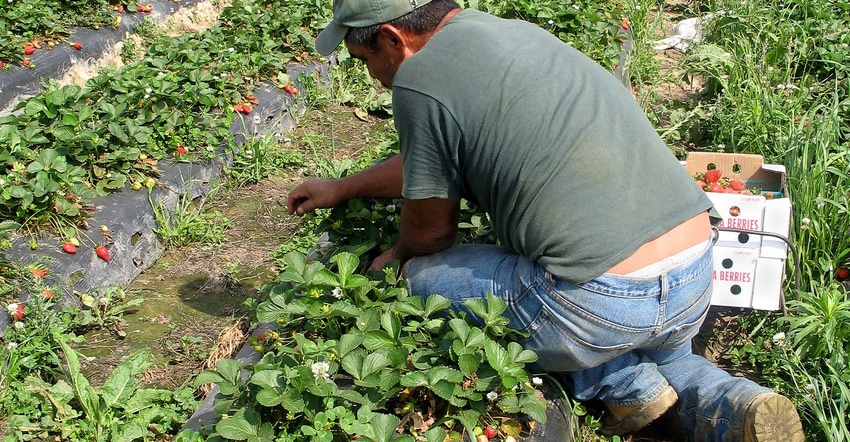
by Mario Parker and Mark Chediak
Recent raids by U.S. immigration authorities targeting undocumented immigrants are creating a wave of distress through America’s agricultural sector, an industry that’s heavily dependent on foreign workers.
Hundreds of arrests have been made in at least six states over the past week. That’s left undocumented workers afraid to travel and farmers pondering whether they can risk hiring them, according to organizations representing both groups.
Farms in the western U.S. have already dealt with a dwindling labor supply, partly because of tightened border security for years, said Pete Aiello, general manager at Gilroy, California-based Uesugi Farms. He worries that things will get worse this year and his company may not be able to find enough contractors.
“The mood is not good,” Aiello said. “It’s one of pretty significant trepidation.”
Contract Workers
Uesugi grows bell and chili peppers, napa cabbage, sweet corn and strawberries across 5,000 acres (2,023 hectares) in California, Arizona and Mexico. Its experience typifies that of many farmers in that part of country. During its seasonal peak, Uesugi takes on about 600 contract workers -- most of them born in Mexico -- to help pick, sort and pack its produce.
More than half of U.S. farm workers are undocumented, according to the American Farm Bureau Federation. President Donald Trump’s threats against immigrants could add up to higher grocery bills as growers and companies wrestle with labor shortages, according to studies from the bureau and the U.S. Department of Agriculture.
The recent series of raids were part of the Trump administration’s Jan. 25 order to crack down on the estimated 11 million undocumented immigrants in the U.S. The administration is focused on “protecting the security of our country through interior enforcement,” White House policy adviser Stephen Miller said over the weekend.
“There’s a lot of anxiety out in the country on labor issues,” said Kristi Boswell, director of congressional relations at the Farm Bureau, a Washington-based trade group. “It’s a real issue, and it’s causing farmers to make hard decisions.”
Strained Force
Trump’s actions have the potential to strip farms and meat-processing plants of labor, and the threat comes at a time when there are already signs of a strained work force.
“We continue to see some signs of labor tightness affecting staffing availability across the industry, especially for new operations, which is another factor that could impact production growth for the whole industry in 2017,” Bill Lovette, the chief executive officer of Pilgrim’s Pride Corp., one of the biggest U.S. meat processors, said on a Feb. 9 conference call with analysts.
The immigration crackdown may also mean rising grocery costs. An approach of only enforcement and not reform could increase food prices by as much as 6% as fruit, vegetable and livestock production wanes, according to the Farm Bureau study. It could also create further hardship for crop growers and livestock operators after years of rout in the agriculture markets sparked the worst slump for U.S. farm income since the 1970s.
Even the Vatican is the feeling the impact of the fear.
California Conference
Attendance will probably be lower than originally planned at a conference scheduled for this week, the World Meeting of Popular Movements -- a Pope Francis initiative that aims to bring together organizations working with immigrants with faith-based groups. Some people that had planned to attend the meeting in Modesto, California, are now pulling out because they’re afraid to travel given their document status, said Jennifer Farmer, a spokeswoman for PICO, a community organization that helped to plan the conference.
“We have some of our worker members registered to go, but they’re afraid of flying, given the climate,” said Hunter Ogletree, an organizer with the Western North Carolina Workers Center in Morganton. Many of the group’s members work in poultry-processing plants, he said. “There’s definitely fear.”
In Milan, Missouri, the immigrant population is shaken, said Axel Fuentes, an organizer with the Rural Community Workers Alliance. Many of his members work in pork farms, meat plants and food-processing factories.
“It’s going to be a crisis in isolated communities like Milan,” Fuentes said. “The companies rely heavily on immigrants and refugees.”
At Uesugi Farms, the company is especially worried because unlike growing wheat or other grains, cultivating bell and chili peppers is labor-intensive, and the operations “still rely on hands,” said Aiello, who’s father, Joe, took over the business more than three decades ago in a handshake deal with its original owner, George Uesugi.
“I’ve been telling anyone who will listen: you either import your workforce or you import your food,” Aiello said. “Unless American citizens are willing to do this work -- which they haven’t shown they are willing to do.”
To contact the reporters on this story: Mark Chediak in San Francisco at [email protected]; Mario Parker in Chicago at [email protected] To contact the editors responsible for this story: Simon Casey at [email protected]
Millie Munshi
© 2017 Bloomberg L.P
About the Author(s)
You May Also Like




